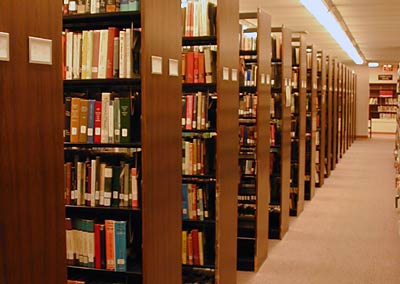|
|
 People looking for books about space in a library usually end up in the science or technology section; should those books instead be in the geography section? (credit: iStockphoto) |
Space and subject classification
by Michael Huang
Monday, August 9, 2004
But if thought corrupts language, language can also corrupt thought.
—George Orwell, “Politics and the English Language”
George Orwell was fascinated by the relationships between language, thought and politics. In the essay “Politics and the English Language”, he criticized the habitual use of euphemisms and opaque language for political ends.
The subject of space has an unintentional habit that influences thought and politics. This habit is not from language, but from subject classification—the hierarchy of topics that permeates every piece of information.
In library classification systems, encyclopedias, mass media, Internet directories, and other general works, space is usually classified under the subject heading of science or technology. Examples include the Library of Congress’s “Q” (Science) and “T” (Technology), Encarta Encyclopedia’s “Physical Science & Technology”, CNN’s “Science & Space”, Google News’s “Sci/Tech”, the New York Times’s “Science”, Slashdot’s “Science” and Yahoo! Directory’s “Science”.
The association between space and science began during the long period of history when space could only be observed. These observations led to the science of astronomy. The association between space and technology formed when machines and humans started traveling through space using rockets and other technologies.
But science and technology are not the only subjects associated with space. Military forces use spy satellites. Many industries use communications satellites. Companies take tourists to space. Humans in space will contribute to all the human endeavors. Classifying space under military, commerce, communications, leisure, history, law, art and others, as well as science and technology, will not help people looking for space information.
A better subject classification can be found in the definition of space. Space is the area between the stars, planets and other objects. (Space is also a general term for any area beyond Earth.) Space is an area, a location, a region. Classifying space as a science or technology is analogous to classifying Antarctica or Greenland as a science or technology. Space is a region, and it should be classified as a region.
| Space is an area, a location, a region. Classifying space as a science or technology is analogous to classifying Antarctica or Greenland as a science or technology. |
One could say that the above information is correct, but question the importance of subject classification to anyone other than librarians. The importance of classification, like any other piece of information, is that it affects the way people think and behave. Let’s say that a big space story breaks, and the editors of The New York Times want someone to cover it. Each journalist has a beat: national, local, foreign, sports, business, science, etc. Space is classified under science, so the editors choose a science journalist. The science journalist will naturally emphasize the science component of the story, and will contact scientists for their reaction to the story. During this whole process, from the editors to the journalist to the finished article, no one is deliberately promoting the science aspects of the story. Everyone simply accepts and works under the assumption that space belongs to science.
Saying that space is a region, and not a science or technology, does not mean that science and technology are unimportant. Science and technology are essential to space activities, and will continue to be so. Saying that space is a region allows other important subjects to be considered as well.
The classification of space as a region affects all major information sources. For example, Internet directories may move space from Science or Technology to Regional. Newspapers may move space from Science to National or International (or rename World to Worlds). There may be a case for assigning a two-letter Internet country code to space, equivalent to the .aq code for Antarctica.
Broadening the subject of space to cover more than science and technology is particularly important at this early stage of our involvement. Classifying space as a region opens the subject to new ideas and a brighter future.
Michael Huang is a student at the University of Melbourne, Australia.
|
|
